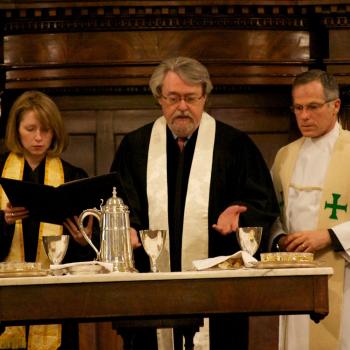A SONG OF JONAH
Or, What Happens When the Prophet is a Jerk
James Ishmael Ford
A Sermon Delivered at
Emerson Unitarian Universalist Church
Canoga Park, California
29 January 2017
A Story
Now God said to Jonah, “Arise, go to Los Angeles, that great city, and cry against their wickedness.” But instead Jonah rose up to flee to Seattle and went and found a ship. God sent out a great wind into the sea, and there was a mighty tempest, so that the ship was about to be broken up off the coast of Santa Barbara.
The mariners were afraid, and cried every one unto their god, and cast forth the wares that were in the ship into the sea, to lighten it. But Jonah was down into the sides of the ship; and he lay, and was fast asleep. The shipmaster came to him, and said, “O sleeper, arise, call upon thy God that we perish not.”
When he saw what was happening Jonah admitted that he was the cause of the storm. So they took up Jonah, and cast him forth into the sea: and the sea ceased from her raging. Then God prepared a great fish to swallow up Jonah. And Jonah was in the belly of the fish three days and three nights. Then Jonah finally prayed from within the fish’s belly, repenting his sins and his flight from his task. And so God caused the fish to vomit Jonah upon the dry land in Ventura.
And for the second time God said, “Arise, go unto Los Angeles, that great city, and preach unto it the preaching that I bid thee. So Jonah arose, and went unto Los Angeles. And Jonah entered the city and he cried, and said to them, “Yet forty days, and Los Angeles shall be overthrown unless you repent your wickedness.” And the people of Los Angeles thought, well, it could be so, and proclaimed a fast, and put on sackcloth, from the mayor right down to the residents of Skid Row.” And God saw their work and that they had turned from their evil ways; and God forgave them.
But this displeased Jonah exceedingly, and he was very angry. And he prayed to God, and said, “I beseech thee, take my life from me; for it is better for me to die than to live.” So Jonah went out of the city and up to the Hollywood Hills, not far from the sign, and sat in the dust.
And God prepared a vine, and made it to come up over Jonah, that it might shelter his old bald head from the heat.
The Book of Jonah (abridged and slightly adapted from the King James Version)
A psychic once said I’d been a rabbi in a recent life. However, my Jewish friends have to a person said the psychic was obviously a fraud. I am, they all seem to think, about the most goyish of their friends, pretty much pure white bread and mayonnaise. And I have to acknowledge while as a grown up I have come to like rye and mustard, still, yes, I do consider white bread and mayonnaise part of my pantheon of comfort foods.
I certainly didn’t know a lot of Jewish people as I grew up among poor white fundamentalist Christians. My first encounters with real Jewish folk were actually “JuBus,” Buddhist-identified Jews. Which is also why pretty much all the Yiddish in my vocabulary was learned as a young adult living in a Buddhist monastery.
Now, and for many years, I’ve been a Unitarian Universalist. And, well, you’ve heard the old joke, I presume. How the guys were sitting in the coffee shop reading the morning paper when Joe looked up from the obituary page and said “Oh, my. Fred died. He was just buried from the Unitarian church. To which Sam replied, “I had no idea Fred was Jewish.” It’s a small joke with a real point. Just as with the Western Buddhist community we UUs count an outsized number of members who come from Jewish backgrounds. In most cases without feeling they’ve ceased being Jewish. Our modern religious scene and particularly our liberal religious scene, is, no doubt, complex and interesting.
And, I think even more interesting is how this influence goes in any number of directions. Judaism has been an important current in the development of our contemporary liberal spirituality. None so important as our UU sense of covenant taking precedent over creed, a central marker of our spiritual identity, and which is derived through the Puritan tradition, but fully rooted within Judaism. And I think for us in our times, these most dangerous and difficult times, we Unitarian Universalists could profit considerably from examining the traditions of Judaism. This tradition is not only a root ancestor for us; it provides insights into our human condition that we can profitably, if critically, of necessity critically, engage.
As I said, these times we live in, are troubled and dangerous. I am aghast at yesterday’s events where the president issued what is beginning to look like a litany of noxious executive orders, this one closing the border to refugees from Muslim majority countries that incidentally he doesn’t have business interests in. And maybe even more disturbing he has just restructured his national security council giving Stephen Bannon, whom I can fully aware of the contours of that term only call a neo-fascist, a significant place at that table.
Religion has many functions. But, one, and one we’ve inherited specifically from Judaism, is speaking truth to power. There are many directions we can go, but today, but I feel a need to address the great mess of those who are called to speak out in harsh and dangerous times. You know, you, and me.
So, with that, what about the fact that those speaking in the stories of old seem pretty much to all be imperfect spokespersons? I think of our modern prophets calling us to our better angels such as Mohandas Gandhi and Martin Luther King, Jr. Both were amazing voices pointing true. And, both flawed vessels, people with significant shortcomings. Some can and do point to those shortcomings as evidence their message is false. I think that’s misdirection. There is something vastly more important in that fact. It is important to consider as you and I look to our place at this time, and what it is, we can do, as the people we actually are.
In fact if we look back to that story of Jonah, we can see the problem of flawed vessels bringing important messages is ancient. Most scholars date the story from somewhere after the Babylonian captivity, as Judaism had evolved its universalist ethic, so sometime after the sixth century before our common era. That’s a long time ago. And, I suggest, it is a problem as current as today.
Now, let’s talk first a little about how we need to engage this story. When I was a child, my father who was an Robert Ingersoll Atheist was particularly focused on the story of the great fish that supposedly swallowed the prophet, as proof the whole of scriptures were a mass of nonsense. And, I certainly would agree this little story has nothing of history about it. What it does is point to some directions of our human hearts, written by people living through hard times, and seeing that even within the clouded heart wisdom and direction can arise. Think of Jonah as perhaps the most humanistic of metaphors for those willing to listen to the points of the story.
I’ve long known that fiction can contain the deepest truths. And so that great fish is not my problem. Jonah is a wonderful story. I really like how it starts with that rushing off for Seattle, in the original version, Tarshish. To the writer, that meant Jonah got his divine commission, and takes off in the exact opposite direction. He was heading for the very ends of the earth. So, we have a first class shirker being picked by God for his important task. What’s not to love here? Sounds like my story, an awful lot of my story. And, maybe, yours, as well? What task you know deep in your heart you should be attending to that you are not living up to? What calling from the depth of your being are you avoiding? What word are you called to share, but are afraid to do so?
Another bit of wisdom known for a very long time. This avoiding those tasks we know deep in our hearts we should be doing, invariably leads to some hard time in the belly of some beast. By the bye, this belly of the fish thing, as I mentioned was a favorite point for mocking by my father; who counted the fish story along with pillars and four corners to the earth as evidence these stories were myths. And for my dad “myth” meant lie.
I, I hope you have picked up, have a different take on myth, on the value of story as a way into our human hearts that can be found if we don’t cling to these ancient accounts as literal truth. I don’t try to take this old story as history, it isn’t. But rather as our spiritual ancestors attempting to address something really important about human lives, which it is. I suspect the rabbis who chose to reflect on this story often had a similar desire. So, back to that belly of the fish in which we land as we try to avoid what our hearts call us to. Most of us can describe our personal version. What consequences have you found in your life out of avoiding your deeper responsibilities? That’s the question this part of the story is pointing us toward.
When Jonah finally, finally gets up and goes and does the prophesying, and the people in their turn repent, I love that he’s royally annoyed that they did what they were called to, and didn’t get their divine punishment. After all that he had gone through, he wanted fire and brimstone. But he got repentance, changed hearts. In fact he’s so angry that things went well for the people, he wishes he were dead. So, Jonah starts as a jerk and ends as a jerk. And along the way he does a couple of good things. This is important to notice. He is a complete jerk. And, he does some good things. And in those good things, despite everything else, he redeems himself. That gives me some hope. Maybe it can for you, as well.
What captures me here is the theme of second chances. Here the divine strews second chances before Jonah like a child throwing fistfuls of rose peddles during a wedding processional. Great globs of second chances picked up in a chubby hand and thrown indiscriminately in our path. I believe the greatest gift of our humanity is that we get these second chances. And, with that here’s another important point. We don’t all get them. A child born into a decade long drought in the third world doesn’t even get a first chance. And, frankly, there are people here in Canoga Park who aren’t getting anything like a fair shake, much less a fair chance. So, if we got them, first or second or whatever; we’re lucky. We are, to use a term popular in some circles right now, privileged.
And, here’s the deal with that: privileged is only an epithet when we don’t take advantage of it to help out someone else. So, those of us who have been given those second and third and often fourth chances, we have an enormous responsibility to take these chances, and to allow the changes in our lives they hold out. And then pass them on. In reality the hope of those children from that destitute place at the edge of our consciousness to the hidden corners of our own community may depend on us living into our possibility of largeness of heart and from that of doing the right thing, from taking the gifts given to us, allowing them to do what they need to do, and then passing them on to others.
It’s that interdependent web thing. It’s that “single garment of destiny” thing. Here we find the secret heart of connection. So, the question of second chances, of turning hearts, and moving in new directions is really important. We do not know where our taking these second chances will lead. But, what I do know, is that they open possibilities where there were few before.
On this way our intentions are critical. We need to notice and intend to change. That’s the gate. We may not succeed the first time, or the second. Frankly it strikes me Jonah never completely comes to terms with the gift of his life. But along the way at heart he intends to do the right thing, as complex and confused as his intention is. And that’s very important. But, that said, our intentions are not quite enough. It’s a gate into the garden, but not the garden. Hence, that notion of the road to hell being paved with good intentions. You can’t just intend good things. We need one more thing that can inform our actions in healthy ways.
Frankly, what that more is, is a small distinction, easily missed. But, it makes all the difference. And, that’s where I think about the vine. Jonah does the job, people repent, and he, filled with anger that they did and didn’t get fire and brimstone, he goes out of the city and sits in the dust, sulking. As I noted, a world class jerk. Then in that lovely coda to the story God causes a vine to grow up and shade, as I imagine it, his old balding head that had been burning red in the harsh Near Eastern sun.
Now in the fuller version of this story the vine is created and destroyed and a relatively obvious moral is drawn out of the event. But I’ve found the most value for me in just contemplating that vine and that shade provided even for foolish, shirking, vindictive Jonah. What that suggests to me, what that sings to me is that I’m not doing this alone. Never have been.
Once again the interdependent web thing, the single garment of destiny thing. The problems come when I think I’m responsible all by myself and must make it happen, must, as one wise person described it, push the river. Can’t be done. The intention that fails us is the one that tries to control things. The intention that leads to the good is surrender to our better angels, and specifically to our willingness to work together. However flawed, however flawed.
That’s all.
Our task laid out for us by the ancestors.
If we are willing. The message is clear. We are all related. We are all responsible. If we’ll turn toward the city, and go as we are, just as we are, and proclaim this good news, to turn from selfishness to companionship, to see how we are all of us connected, all of us bound in that single garment, hope opens for all of us.
And then we can find a way.
Just a word from a friend passing through.
Amen.













